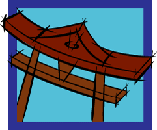 |
|
Am I a "henna gaijin"?By Tim YoungFrom SIF SATELLITE issue 48, Fall 1997Ryuichi was a student at an Italian university. He had played violin in high school in Japan, and he was looking forward to studying violin in Europe. After all, the violin originated in Europe, and he would be able to play the instrument surrounded by the culture that spawned it, in the land where Stradivarius violins were made. But when he arrived, he was taken aback by most Italians' reaction when he told them he had been studying violin. "Really?" they asked. "Most Italians don't know much about the violin. Why did you want to learn to play it?" What's more, some Italians thought he was a "strange foreigner" because he was more interested in Italian culture than in his own. "What's so strange about it?" he wondered. "Do I have to like only music from my own culture?"
This story is fictional, and probably wouldn't happen. But it reflects my own impressions of Japan's attitude toward its native culture. When I was in college in America, I studied the koto, a Japanese musical instrument. Now, this is surely unusual in America. Most music students in America learn Western music on Western instruments, or sing songs of American or European origin. But because of my interest in Japan since high school, I was drawn to studying the koto; I couldn't pass up the unusual opportunity offered by my college. During my stay in Japan, I have taken some koto lessons; I studied with a Japanese teacher for a year and a half. While my teacher did not seem to be terribly puzzled by my interest in Japanese music, some of my English students have been. Also, I have read articles about foreigners who get more deeply involved in Japanese traditional culture than I have—wearing kimono, becoming professional shakuhachi players, that kind of thing—and have been called "henna gaijin" by Japanese who can't understand why a foreigner would be interested in Japanese culture, rather than his own. Well, why not? After all, Japanese are much more likely to be familiar with European composers like Mozart or Beethoven than with Japan's own great composers like Yatsuhashi Kengyo or Michio Miyagi. Most Japanese have at least heard of William Shakespeare, but how about Chikamatsu Monzaemon, who is sometimes known as "the Shakespeare of Kabuki"? If you wonder why I should be interested in playing the koto, why shouldn't I wonder why many Japanese are interested in playing the violin, to the point that a world-renowned methodology of teaching the instrument was developed by a Japanese, Shinichi Suzuki? It seems to me that Japanese are discounting their culture as somehow less important or less valid than Western culture. Having enjoyed the sound of the koto, having been throughly enthralled by six-hour presentations of colorful and exciting kabuki and bunraku, the attitude—and simply lack of familiarity—that Japanese have for their own cultural background is disturbing to me. I think this attitude must have originated in Meiji times. In the 1860s, the Japanese government decided that the technological lead that the Western countries had over Japan signified their superiority to Japan in all aspects of life, and so there was a movement to throw away anything "Japanese" and imitate the West as much as possible. Japan's leaders, including the Meiji Emperor, were photographed in German military uniforms. Wearing a Western-style top hat and coat and carrying a cane were the sign of an "enlightened man"; those who insisted on continuing to wear samurai dress were hopelessly backward. While there was a backlash against this attitude during Japan's militaristic era, defeat by the Western powers in World War II again convinced many Japanese that the West (especially America) was superior to Japan and should be imitated. I certainly do not believe that any country is "better" than any other country, nor do I believe that military or technological superiority by a country indicates the superiority of the nation's culture as well. Because the West developed steam trains while Japanese were still using rickshaws, does that mean Mozart is better than Yatsuhashi Kengyo? Of course not. They were both great musicians and should be equally appreciated. While it is not so surprising (though unfortunate) that Yatsuhashi is nearly unknown in the West, it is certainly a shame that his name only reminds most Japanese of his namesake snack food produced in Kyoto, rather than his composition that every koto player knows, Rokudan no Shirabe. Nonetheless, Japanese performing arts are still kept alive by dedicated professionals. You can still study koto or shamisen here; you can still go to kabuki performances in large cities, or watch them on TV (especially at New Year's). Interestingly, on both occasions when Japanese have accompanied me to kabuki performances, they were every bit as fascinated by the spectacle as I was. Many other Japanese whose only experience with kabuki was dozing through a performance on a high school field trip may be surprised at how interesting they find the great dramas of their own culture to be, if they only take the time to understand them. While outdated language and cultural practices may make this difficult for modern Japanese, Kabuki theaters in Tokyo provide earphone explanations in Japanese, as well as English. My wish for Japan is that it would better appreciate its rich cultural heritage. Maybe then it would realize why some foreigners are interested in it, too, and we wouldn't be thought of as "henna gaijin." |
Copyright 2003  This page last updated
December 9, 2005
. E-mail Tim
This page last updated
December 9, 2005
. E-mail Tim
